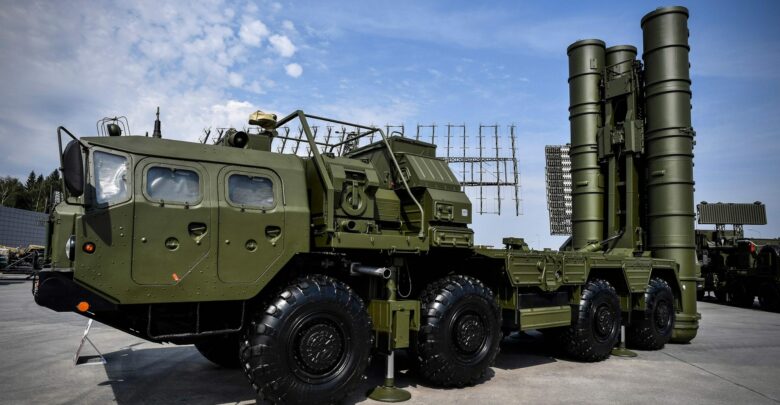In recent weeks several proposals have been made to arm Ukraine with Russian-built military hardware from the arsenals of NATO member states. There was Poland’s widely-reported offer of its fleet of Soviet-built MiG-29 Fulcrum fighter jets, which the United States declined, and Slovakia’s more recent offer to supply its arsenal of S-300 air defense missiles. Since its military still needs them, Greece has said it will not send any of its Russian-built Tor-M1 or 9K33 Osa missiles. On the other hand, it’s unclear if Athens would be willing to transfer the S-300s it has stored on the island of Crete if Kyiv requests them.
Now, American officials are proposing that NATO member Turkey could potentially arm Ukraine with the much more sophisticated Russian-built S-400 missiles it took delivery of in 2019.
“It is the very system, made by Russia, that American officials punished Turkey — a NATO ally — for buying from Moscow several years ago,” the New York Times noted. “Now American diplomats see a way to pull Turkey away from its dance with Russia — and give the Ukrainians one of the most powerful, long-range antiaircraft systems in existence.”

Washington was deeply irked when fellow NATO member Turkey took delivery of these Russian missile systems back in 2019. It immediately suspended Ankara from the fifth-generation F-35 Joint Strike Fighter program and later slapped sanctions on its Presidency of Defense Industries (SSB). Washington has repeatedly affirmed it won’t reverse any of these decisions until Ankara completely removes all S-400s and their components from Turkish soil.
If Turkey were to take this opportunity to transfer its S-400s to Ukraine, it would simultaneously provide Kyiv with an air defense system that is much more advanced and capable than any it ever fielded and eliminate Washington’s justifications for sanctions and the F-35 ban. If it could not immediately order F-35s after doing so, Ankara could, at the very least, probably acquire the 40 advanced Block 70 F-16s and 80 modernization kits it requested last October, which could keep its huge F-16 fleet operational and up-to-date for the next decade at least.
Furthermore, the U.S. could offer Patriot PAC-3 air defense missiles if Turkey gets rid of S-400, which, it’s worth remembering, Ankara has not yet put in service almost three years after taking acquiring them. The U.S. previously offered Turkey Patriot missiles if it agreed to ditch the S-400.
Transferring such arguably ‘game-changing’ Russian-built missiles to Ukraine would undoubtedly not go unnoticed in Moscow.
Russia was already infuriated by Turkey’s sale of armed Bayraktar TB2 drones, which are still carrying out combat operations against Russian ground forces almost a month into this war, to Ukraine before the present war began. Ukraine first used them in combat to destroy an artillery gun in a target strike in the Donbas region late last October. After Russia protested against that incident, Turkish Foreign Minister Mevlut Cavusoglu insisted that when a country buys Turkey’s drones, they are “no longer a Turkish product” and, thus, Turkey cannot be blamed or held responsible for how or where they are used.

In mid-2020, Aleksei Erkhov, Russia’s ambassador to Turkey, used an amusing metaphor to sum up Turkey’s ownership of the S-400.
“We’ve sold the system that Turkey wanted to buy,” Erkhov said. “The owner of the system is Turkey.”
“We sold the car, took the money and delivered the car,” he added. “It is now your car. You can go to the beach, carry potatoes or you can deploy a machine gun and go to war. But you can also keep it in your garage.”
It’s unclear if this cavalier attitude would extend to Turkey supplying them to Ukraine or if Turkey would risk the collapse of its delicate diplomatic balancing act it is maintaining between Moscow and Kyiv. It’s also worth bearing in mind that the U.S. only informally suggested that Turkey could supply Ukraine with its S-400s and likely expects the proposal “to be shot down” by Ankara. As of writing, Turkey hasn’t commented on it.
Perhaps there is a way that Turkey could offload the S-400, wash its hands of the political debacle around it, and have the missiles passed on to Ukraine without incurring the full wrath of Moscow. Rather than supplying the S-400s to Ukraine directly (which would be, in and of itself, a very difficult feat), Turkey could instead sell them to the United States (a U.S. senator proposed an amendment to buy them back in June 2020) or any other NATO member state up to the challenge of transferring them to the embattled Eastern European country. That way, it could counter Moscow’s inevitable protestations by, not unlike Cavusoglu did with the sale of TB2s, invoking the technicality that it wasn’t Turkey that directly armed Ukraine with the sophisticated system.
While this probably won’t happen, it still, nevertheless, cannot be completely ruled out, especially in light of the numerous unprecedented world-altering events that have taken place since Feb. 24.

If this state-of-the-art system, which Russia has for years claimed is superior to its Western equivalents, is transferred to Ukraine, it would be somewhat ironic if it ultimately proves its capabilities by blasting Russian fighter jets and missiles out of Ukrainian skies.
By: Paul Iddon
Source: Forbes



